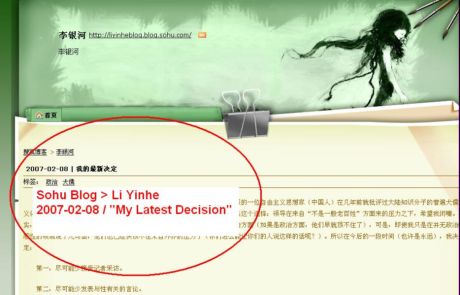February 14 — China’s most controversial expert on human sexuality, Li Yinhe (李银河), is once again the focus of news and commentary in China following allegations on her personal Weblog last week that officials have warned her to keep quiet. [BELOW: Screenshot of February 8 entry from Li Yinhe’s Weblog alleging pressure from officials to “shut up”].

In a February 8 posting on her personal blog, Li Yinhe, a scholar with the Chinese Academy of Social Sciences (CASS), wrote that leaders were pressuring her to “shut up”. In the near future, she said, she would “accept fewer interviews with reporters” and “make fewer comments about sex”. “Right now”, Li wrote, “I am faced with this decision: I am under pressure from officials ‘who are not ordinary people’. [They say] they hope I will keep my mouth shut”.
A commentary in Monday’s Southern Metropolis Daily, and excerpted in today’s Chongqing Morning Post, said the silencing of Li Yinhe posed a threat to the speech freedoms of all those who criticize her views, not to mention those who support them:
Clearly, if Li Yinhe’s voice can be so easily suppressed then the interests and right to speak of all those who curse her [for her views] will be difficult to safeguard, and the voices they wish to hear might suffer similarly.
Protecting freedom of expression necessarily means we will have to hear some voices we don’t particularly like. This is a necessary price to be paid for freedom. If we must choose between “hearing both those voices we like and those we don’t” and “hearing absolutely nothing”, we should opt for the former.
An editorial from Li Rui (李辉) in yesterday’s Southern Metropolis Daily offered a slightly different view to the spirited defense of speech freedoms voiced the day before. Countering Li Yinhe’s point that her statements about sex were not political, and therefore not threatening, the editorial expressed intellectual sympathy with officials who might find Li Yinhe’s views politically provocative:
Surely, Li Yinhe’s sex topics are not [overtly] political topics. But this does not mean they do not have political significance. As a disciple of [Michel] Foucault, Li Yinhe most certainly understands the political significance of “sex”. For her to say such a thing is naturally a deceit with which to protect her freedom to express her views … So, for those [officials] “who are not ordinary people”, they cannot possibly tolerate tolerance toward Li Yinhe and her freedom to express herself.
An editorial in yesterday’s Information Times firmly defended Li Yinhe’s right to speak her mind, and said a multiplicity of voices was a sign of a “healthy, scientific and rational” society of citizens:
In the eyes of some, Li Yinhe is the epitome of “different”. Particularly concerning some of her statements about sex, there are some people who simply find her shocking and hard to accept. But regardless of whether you understand Li Yinhe, or see her as a freak, no one has the right to shut her up. No one can, through whatever means, deny her right to speak.
In a healthy, scientific and rational citizens society and public space, various kinds of advance guard speech should be tolerated. The expression of different voices not only benefits a balanced ‘opinion environment’ but these competing points of view will bring about social debate at all levels and will be beneficial in promoting deliberation in society generally. They will also be beneficial in fostering civic rationalism, helping to build consensus through debate …
A February 12 editorial in Shanghai’s Oriental Daily argued for greater tolerance for diverse voices in Chinese society, including ones many people may find offensive:
The expression of different voices not only benefits the ‘opinion environment’, but these voices and viewpoints and the discussions they prompt are beneficial to clearing up our ideas that seem right but are actually wrong. People at all levels [of society] can reach a common understanding through the sharing of opinions.
The editorial related Li Yinhe’s “right” to speak her mind to the constitutionally guaranteed right [Chapter II, Article 5] of every Chinese citizen to freedom of expression:
Regarding sensitive topics like sex, whether one tends to conservatism or advocates personal free license, so long as it falls within the law, no-one, including myself or Li Yinhe, has the right to ‘give the final word’. You can disagree with Li Yinhe’s viewpoints, but you have to admit that her views have aroused a great number of citizens. Li Yinhe’s right to speak her views are actually the same thing as every citizen’s right to speak his or her views.
[Posted by David Bandurski, February 14, 2007, 3:35pm]




















